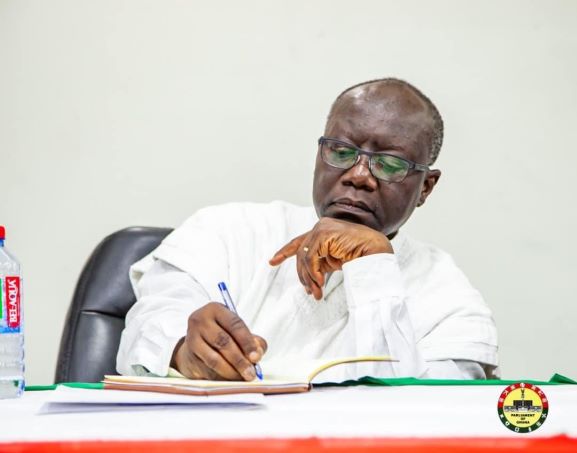Development Bank Ghana (DBG) has created two funds worth GH¢900 million to support agribusiness and Small and Medium Enterprises (SMEs).
GH¢500m DBG Emergency Economic Programme
The bank has established a GH¢500 million special credit programme dubbed the DBG Emergency Economic Programme (DEEP) to support businesses in the agribusiness value chain over the next five years.
Priority sectors
The priority sectors are poultry, rice, cereals, pharmaceutical manufacturing, tourism, textiles and garments for investments to help build economic resilience.
Priority sectors
Finance Minister Mr. Ken Ofori-Atta disclosed this in the 2023 Budget Statement and Economic Policy of government.
GH¢400m private equity fund
To support SMEs with equity funding, he said DBG is also in the process of establishing a private equity fund with an initial capitalization of about GH¢400 million.
4 Participating Financial Institutions
He disclosed that DBG has fully on-boarded four Participating Financial Institutions (PFIs) and will engage other financial institutions to expand its loan channels.
GH¢ 245.3m disbursed
Ofori-Atta announced that a total of seven loans amounting to GH¢ 245.3 million (GH¢ 245,322,000) were disbursed to SME’s saving over 1,000 jobs.
Digital lending platform
He noted that DBG has partnered with a PFI to build a digital lending platform to shorten the processing time for lending to SMEs and increase its ability to reach a lot more businesses across the country.
DBG commenced operations to help meet demand for credit for small and medium enterprises (SMEs) and contribute to growth.
The Ministry of Finance had extensive technical engagements with KfW in Germany; multilateral institutions like the European Investment Bank; the World Bank and the African Development Bank, in order to mobilise international funding, diversify its shareholding and institute best practices to have an independent board and a financially sustainable institution.
Equity investments
Accordingly, government put up an initial equity investment of $250 million, the European Investment Bank €170 million, World Bank $225 million, and $40 million grant came from the African Development Bank.
The plan is for the bank to grow five-fold over the next five years to help end a shortage of funding to small- and medium-sized enterprises.
It will lend between $5 million and $30 million to commercial banks.
Those banks will then on-lend three to 15-year loans of $25,000 to $3 million to small companies at an affordable interest rate.
DBG’s aim is to raise the proportion of loans given to small businesses in Ghana from around 9% to 15% in two years.
Initial disbursements will go to CalBank Plc, Consolidated Bank Ghana Limited, Fidelity Bank Ghana Limited and Ghana Commercial Bank Limited.
The current amounts available are just take-off funds, and there is a big programme by development partners to grow the amounts.
Lender plan to conclude arrangements with other finance institutions, including micro-lenders, as well as providing credit guarantees to participate.
Managers expect to initially replenish and grow the institution’s funds from development-finance institutions; it plans to tap commercial lenders at a later stage.
In three to five years, the managers expect to see a window to be able to turn to the market to raise funds.
Many small businesses lack the credit-worthiness or track record to secure normal bank loans.
Companies with 100 workers or less struggle to get loans in Ghana, with a World Bank report estimating the gap between supply and demand was equivalent to 13% of Gross Domestic Products (GDP) in 2017.
Micro, small and medium enterprises (MSMEs) are the largest segment of the economy, creating employment for many.
MSMEs in Ghana have not performed creditably well and have not played expected significant role in economic growth.
The MSMEs sector in Ghana is estimated to be made up of 70% of all industrial establishments.
They contribute about 22% to GDP and account for about 92% of businesses in Ghana and absorb more than 60% of employed labour force, with majority in rural areas, placing MSMEs squarely at the core of the overall economic policy.
It is also estimated that 85% of manufacturing employment and, to a larger extent, overall employment growth in the country come from the sector.
Long-term lending is extremely rare for smaller businesses in Ghana, and this has stymied the development of sectors ranging from agribusiness to manufacturing and information and communications technology.
An efficient financial sector that facilitates access to medium- and long-term capital at affordable interest rates is a prerequisite for sustainable growth.
By providing longer-term financing through DBG, Ghanaian businesses, specifically SMEs, will be able to make productivity-enhancing investments, thereby, allowing them to retain and create jobs also for young Ghanaians.
In this way, DBG can contribute to the recovery from the COVID-19 crisis and to economic growth in Ghana.
- Tuesday, April 15, 2025 Newspaper Headlines - 15 April 2025
- PMMC-issued gold licenses for individuals invalid — Goldbod - 14 April 2025
- KNUST declares 2 former students persona non grata - 14 April 2025

